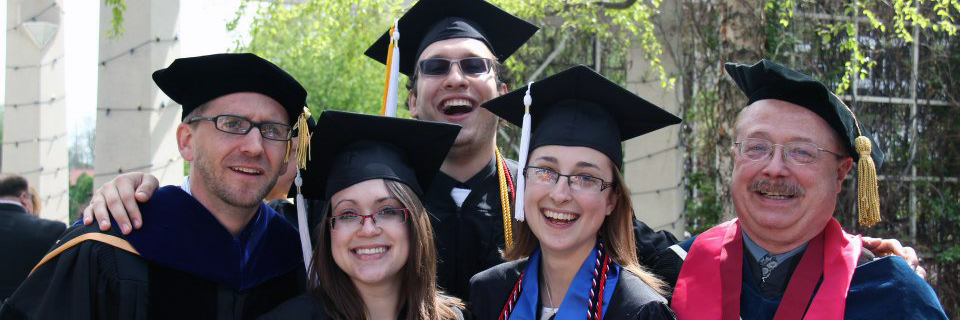Humans of RU
Katie Birkenfeld, '13

What is your definition of success?
For many, it’s how far you can get in your career. Specifically, maybe it’s a title, salary or how many direct-reports you have.
Higher education serves as one of the initial steps on someone’s climb to their version of success, be it the top of the corporate ladder or a fulfilling career to make other goals possible. And rightly so.
But college doesn’t just serve as a career factory. At least it shouldn’t. Do you want to be a successful professional, or a successful human being who is also a successful professional?
There’s a big difference. Just ask Rockhurst University graduate Katie Birkenfeld (’13, pictured: second from left).
Birkenfeld’s time at Rockhurst wasn’t just about learning what was on any class’s syllabus; it was what came with it.
And it almost never happened.
As a high schooler Birkenfeld interviewed for a particular scholarship at RU, but it was awarded to another student. Undeterred, she returned to campus to interview for another.
To her surprise, Rockhurst faculty members remembered her and what they talked about at her last visit.
“I knew then I wanted to go to a place where I could build relationships with professors, not only inside the classroom but outside as well,” Birkenfeld said.
That initial sense of community grew during her time on the Rock.
“Living on campus was great,” she said. “The main thing I enjoyed was the friendships I created both with professors and other students. The group of friends that was cultivated there is the same I see nearly every week now. They’re who I’m closest with. I had a great relationship with my professors. I would run into them in the hallways of Sedgwick and those relationships enabled me to have more ad hoc and off-the-cuff conversations, which I think was valuable.”
In the classroom, Birkenfeld soon realized that it wasn’t just what she learned from these professors, but how she learned. It began in a philosophy class and moved on to other humanities courses. That closeness with her professors established trust and enabled her to grow more as a person.
“The big piece is critical thinking,” she said. “You go to RU to get skills to know how to think and how to problem-solve and how to get through situations. Others may be ‘here’s the topic and move on.’ Rockhurst enhances critical thinking skills for the workplace because you’re having to problem-solve.”
To find career success, anyone at any step of the ladder knows that your communication and collaboration with co-workers leads to longevity.
Now, more than ever, how you treat people matters.
“[Rockhurst] gives you the ability to look at things from different perspectives and different walks of life,” Birkenfeld said. “It helped me be a more worldly individual, which I think is different compared to other organizations and schools. If you’re working with diverse individuals in the workplace, RU prepares you to take in all that information and how to think through situations from all angles with respect – rather than barrel through with your own opinions.
“A degree in humanities gives you the opportunity to study different cultures, times, etc. and place yourself in different situations and give different perspectives,” she continued. “It gives you some comfort with the unknown and chaos, which you will need in the workplace. [It’s] having a degree that says, ‘Hey, I’m a good communicator; I understand where people are coming from; I understand critical thinking, I understand what I need to do to create positive change in the world.’
“It’s taking those skills to become a great individual person and applying those to the workplace.”
Birkenfeld graduated Rockhurst with a degree in English (writing) and philosophy, with a minor in political science. She then earned a master’s in liberal arts with a minor in ethics (medical ethics concentration) from the University of Missouri-Kansas City and began working at Quest Diagnostics in the KC Metro area in marketing with the employer population health business unit.
For her career success thus far, she credits the humanities faculty for being “phenomenal” and “investing in their students.”
Academics gave Birkenfeld the knowledge to be successful in a job, but Rockhurst’s community gave her something more.
“It gives you the skills you need to be successful as a human being in a job,” she said.
And maybe that is the true measure of success.







